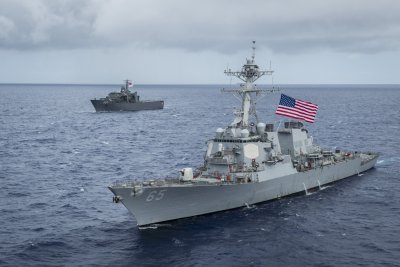The United States Navy said it dispatched a destroyer to challenge "excessive maritime claims" in the South China Sea on Wednesday by sailing the warship near one of China's fortified features in the Spratly Islands.
The Arleigh Burke-class guided-missile destroyer USS Benfold conducted what was its second freedom of navigation operation (FONOP) to be reported by the Navy this year, after a similar mission around the disputed Paracel Islands in July.
The FONOP took the American vessel within 12 nautical miles of Mischief Reef, the U.S. 7th Fleet said on its website. Citing the United Nations Convention on the Law of the Sea (UNCLOS), the statement noted that the reef—controlled by China but also claimed by the Philippines, Vietnam and Taiwan—is not entitled to a territorial sea as it is submerged at high tide.
An island-building campaign by the Chinese government since the mid-2010s has seen the atoll, and other features in the energy-rich sea, fortified with a runway and airfield, altering its natural state.
"The land reclamation efforts, installations, and structures built on Mischief Reef do not change this characterization under international law," the 7th Fleet said in one of its most detailed reports yet. "By engaging in normal operations within 12 nautical miles of Mischief Reef, the United States demonstrated that vessels may lawfully exercise high-seas freedoms in those areas."
In 2016, the Permanent Court of Arbitration in The Hague reaffirmed the UNCLOS definition in the case Philippines v. China, which, among other findings, ruled that Mischief Reef fell within the exclusive economic zone and continental shelf of the Philippines. The People's Republic of China (PRC), which claims historic rights to every island in the South China Sea as part of its "nine-dash line," rejected the verdict.
In a statement online, Tian Junli, a People's Liberation Army spokesperson, said USS Benfold had "unlawfully entered the waters off Meiji Jiao without permission from the Chinese government," using the Chinese name for the reef.
Tian said the destroyer was "followed, monitored, warned and expelled" by Chinese naval and air forces—a repeat of similar claims made during past encounters in the area. He accused the U.S. of "violating China's sovereignty and security," and "creating risks" in the region.
In a response enclosed within its original statement, the 7th Fleet described China's statement as "false," adding: "USS Benfold conducted this FONOP in accordance with international law and then continued on to conduct normal operations in international waters.
"The operation reflects our commitment to uphold freedom of navigation and lawful uses of the sea as a principle. The United States will continue to fly, sail, and operate wherever international law allows, as USS Benfold did here. Nothing PRC says otherwise will deter us."



USS Benfold's FONOP was the first to be conducted since China introduced a new maritime reporting law for foreign vessels passing through its "territorial sea," a term Beijing also uses for waters around the disputed features that it claims. The new regulation came into effect on September 1.
"U.S. forces routinely conduct freedom of navigation assertions throughout the world. All of our operations are designed to be conducted in accordance with international law and demonstrate that the United States will fly, sail, and operate wherever international law allows—regardless of the location of excessive maritime claims and regardless of current events," the 7th Fleet's statement said.
"Freedom of navigation operations in the South China Sea are a part of daily operations of U.S. military forces throughout the region," it concluded.
During visits to Singapore and Vietnam in August, Vice President Kamala Harris said China was guilty of coercion, intimidation and bullying against other claimant states in the region.
Harris said the U.S. would maintain its "strong presence in the South China Sea" to counter Beijing's sweeping claims to almost the entire area.
Uncommon Knowledge
Newsweek is committed to challenging conventional wisdom and finding connections in the search for common ground.
Newsweek is committed to challenging conventional wisdom and finding connections in the search for common ground.
About the writer
John Feng is Newsweek's contributing editor for Asia based in Taichung, Taiwan. His focus is on East Asian politics. He ... Read more
To read how Newsweek uses AI as a newsroom tool, Click here.








